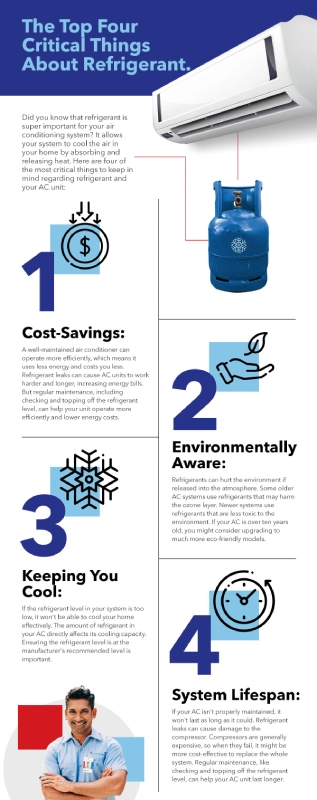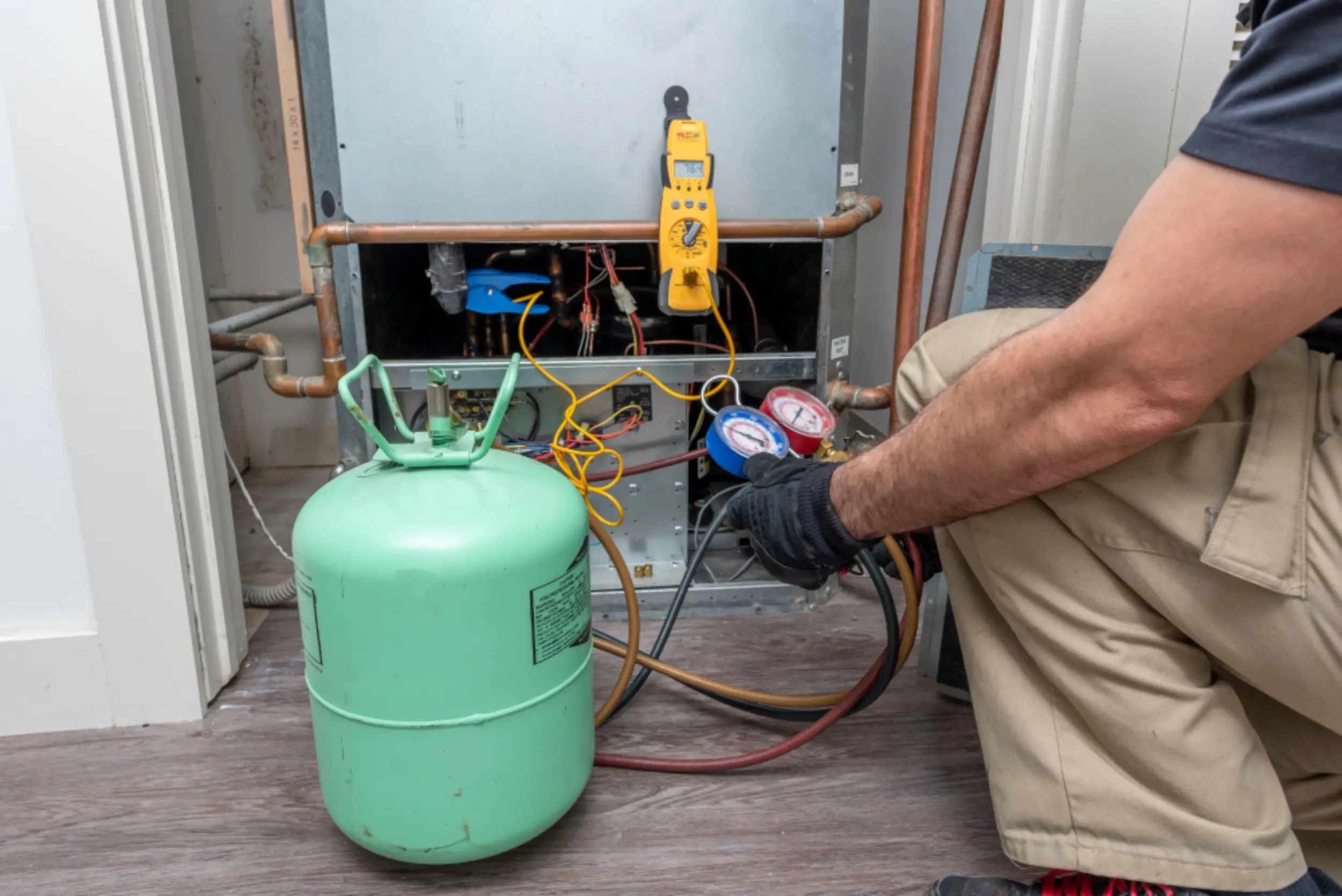What Is Refrigerant and Its Importance for Air Conditioners
Last updated: 6/16/2023 and reviewed by our team of HVAC experts
When air conditioners work as they’re supposed to, we rarely think about their components. It isn’t until something goes wrong that we consider how things such as AC refrigerant impact the system. This compound is often found in a gaseous or fluid state. It works by absorbing heat from the environment and provides refrigeration or air conditioning when combined with components such as evaporators and compressors. A little understanding of how refrigerant works can help you better appreciate its important role in ensuring your air conditioner continues to work efficiently.
How Refrigerant Works
Refrigerant is found inside your air conditioner’s copper coils. When the AC refrigerant absorbs heat from inside your home, it transitions from a low-pressure gas to a high-pressure liquid. Air conditioners send the refrigerant outside, where a fan blows hot air over the coils and exhausts it to the exterior.
Then, the air conditioner refrigerant cools down and turns back into a low-pressure gas. A second fan inside the home then blows air over the cool coils, distributing the resulting cool air throughout your space. This cycle repeats to keep your home or business at a comfortable temperature.
Types of Refrigerants
Just what is refrigerant made of, anyway? The most common refrigerant used for air conditioning over the years include:
- Chlorofluorocarbons (CFCs), including R12. This is known to contribute to the greenhouse gas effect. Production ceased in 1994.
- Hydrochlorofluorocarbons (HCFCs), including R22. Although slightly less damaging to the ozone than R12 was, the EPA mandated a phase-out with the Clean Air Act of 2010. R22 was completely phased out by 2020.
- Hydrofluorocarbons (HFCs), including R410A and R134. With no chlorine in the mix, HFCs are safer for the environment. Air conditioners that run on R410A are more efficient, reliable, and offer better air quality.

How to Fix a Refrigerant Leak
Curious about how to fix a refrigerant leak? This is one repair best left to the professionals. Contacting a professional will ensure the repair is done properly and holds up over time. Moreover, major repairs require experience, tools, and special techniques. Even an experienced DIY homeowner can do more harm than good when attempting to repair air conditioners. Instead of attempting a DIY fix, call in the professionals at your local Aire Serv to get the job done right.
Laws Governing the Use of Refrigerants in Air Conditioners
Some refrigerants, like R410A is an HFC, are now categorized as hazardous material. This has prompted the EPA to establish specific rules regarding the handling and disposal of AC refrigerant:
- Intentionally venting refrigerant is prohibited. Low-loss fittings must be used to limit the amount of refrigerant released while purging, connecting, or disconnecting air conditioners.
- Service professionals must do their best to recapture, recycle and dispose of refrigerant safely.
- Air conditioners and other appliances that use refrigerant must be disposed of according to the EPA’s disposal rules.
- Refrigerant leaks must be repaired within 30 days.
- Only licensed heating, ventilation, and air conditioning (HVAC) companies and service professionals can purchase refrigerants.
- Violation of these and other refrigerant regulations results in harsh punishments from the EPA, including fees of up to $37,500 per day.
Should You Upgrade Your AC Unit?
Check your air conditioner’s exterior component. If it lists R22, you’re cooling with an outdated, environmentally hazardous refrigerant. The EPA doesn’t require you to upgrade your equipment immediately. However, a repair is no longer possible if a refrigerant leak occurs, as R22 is no longer available in the United States. Additionally, R22 and R410A are not interchangeable.
Instead of waiting for your older unit to break down, consider upgrading now. You’ll find that the increased efficiency and reliability are worth the initial investment. Contact your nearest Aire Serv® location for assistance. We offer free estimates, accurate sizing, flexible financing options, and extended warranty plans for the best upgrade experience possible.
Still have questions about how refrigerant works? Here are answers to the most frequently asked questions regarding AC refrigerants.
What Does Refrigerant Do?
AC refrigerant is a heat transfer medium. That means it helps move heat from your space and replaces it with cooler air. If you have a heat pump, the system reverses its refrigerant flow, allowing you to bring heat into your home even during cold winter months.
Does AC Refrigerant Need to be Refilled?
While regular air conditioner maintenance is important, refrigerant isn’t something you need to worry about monitoring. Refrigerant is part of a closed-loop system, just like a vehicle's steering fluid or a PC's coolant. It should never run out or need refilling. If you’re concerned about an AC refrigerant leak, it’s best to have a heating and cooling professional take a look and assess the issue.
How Do I Check My AC Refrigerant Levels?
If you believe your air conditioner refrigerant is running low, contact an HVAC professional to diagnose the issue. They are equipped with electronic leak detectors that will accurately determine whether your refrigerant levels are low.
Do I Have an AC Refrigerant Leak?
If you’re concerned that your AC refrigerant is leaking, be on the lookout for warning signs such as short cycling and reduced cooling in your home. You may also notice hissing or bubbling noises from your outside unit or ice collecting on the evaporator coil. Call the Aire Serv professionals to diagnose and repair the issue in such instances.
Are All Refrigerants the Same?
There are several AC refrigerant types on the market. New varieties tend to be more efficient and eco-friendlier. Of course, not all refrigerants can be used in every system. If your system springs a leak, the type of refrigerant it uses can determine whether you need a simple repair or total replacement. If you’re using an older AC unit that relies on R-22, this refrigerant type is no longer available. You’d need to replace the entire system completely.
Need help determining what refrigerant your AC system uses? Ask the experts at Aire Serv for help.
Can I Repair AC Refrigerant Leaks Myself?
No, you should not attempt to repair a refrigerant leak yourself. Air conditioner refrigerant leaks must be diagnosed and repaired by professionals. The average person doesn’t have the skills, tools, or experience necessary to fix such this issue properly, and one wrong move could result in serious, more expensive damage to your system. Don’t attempt to repair a refrigerant leak yourself, turn to the professionals at Aire Serv for trusted, reliable AC repairs and service.
 Click to call
Click to call


